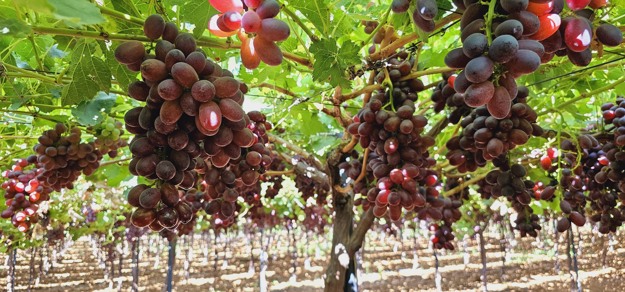
Saudi Arabia placed an embargo on Lebanese agricultural product imports in 2021. Since then, Agrotica's 45,000 peach trees have become virtually worthless. "In two months, I'll uproot and replace them with grape vines," begins Mehydin Kazoun, manager of the cultivation and export company in Lebanon's Bekaa Valley.
Mehydin sees no sales opportunities for that stone fruit. "We could go to Iraq, but Jordan and Iran operate there. That's ultimately an unattractive market. By switching to grapes, we can keep on the path of specialization. My father and uncle, who own the farm, grow potatoes and wheat; I'll focus on grapes. The government buys the subsidized wheat, and potatoes easily reach the local market and the Gulf States. Grape cultivation is export-oriented."
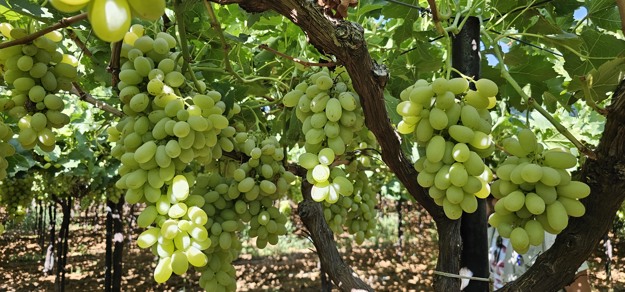 Grapes thrive in the climate and fertile soil of the Bekaa Valley
Grapes thrive in the climate and fertile soil of the Bekaa Valley
Royalties and Lebanon: a stormy marriage
Grapes thrive in the Bekaa Valley's climate and fertile soil. They have exceptional flavor and a more than adequate shelf life—all the ingredients for successful exporting. Yet, not everything runs smoothly, as Mehydin's personal story proves: "When I started growing grapes in 2014, I invested a huge sum purchasing some Sun World varieties. I bought them from someone who assured me everything was 100% in order regarding royalties. But when I prepared for my first export a few years later, it turned out that wasn't the case at all. I was left in the lurch," he says.
Sun World varieties
At the recent Fruit Logistica, Mehydin spoke to Sun World, which, it turns out, does not grant royalties in Lebanon, apparently because of the country's flawed legal framework. It seems there is too great a risk that they cannot enforce their rights in case of infringements. Growers, therefore, cannot export Sun World grapes to countries that respect intellectual property. "I'm not giving up, though. I want to regularize my situation with the breeder. I hope to reach an individual agreement with them so that I can ship the grapes to the EU, US, and Canada. Those are fantastic markets that welcome these varieties with open arms."
Early varieties are gradually replaced by late grapes
Unique marketing window
Agrotica exports grapes to Africa, Asia, the Gulf States, and Europe. It works closely with external consultants in this, an additional asset for the company along with the product's quality. "We're also gradually replacing our early varieties with late grapes. Thus, we benefit from a unique marketing window; we enter the market when Egypt's season ends. Also, Egypt started even earlier than usual this year, so that's extra beneficial to us. And Turkey has had a lot of weather-related problems. The Gulf States, Asia, and Africa are all calling to tell us to send grapes. The price is no issue, they say. It's, obviously, nice to do business that way," Mehydin says.
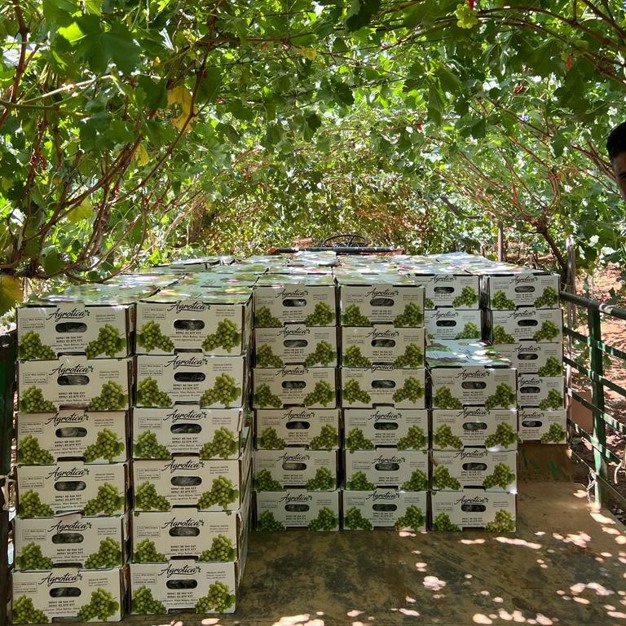
Packed grapes on the field
Thanks to the grapes' good quality, Agrotica can sell some refrigerated varieties until March. "And then they're still crisp," Mehydin's father adds. Especially in the Gulf states, they have a price advantage in winter over South Africa, which has to deal with higher logistics costs.
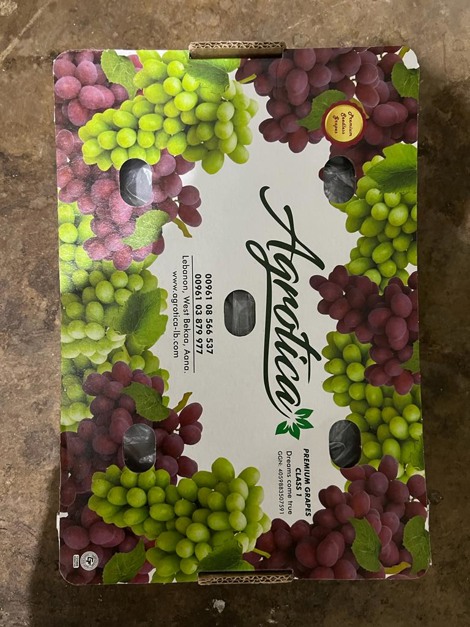
Export will increase to 5000 ton
Providing employment is a driving force
Mehydin reckons on a 2,500-ton harvest this next, which should slowly reach 5,000 tons in the next few years. "I dream of managing a 20,000+ ton production. We're definitely taking the long view. We have land but also rent with contracts of up to 20 years. Another thing: we perform a social function in the area. About 150 families depend on our cultivation and trade for their livelihood. We don't want to disappoint those people and want to support even more households. In a few years, that will be not only with field or office work but also in our planned packing facility. For now, we pack grapes, loose, in the field. Some markets love that layer of dust on the directly-packed grapes. If punnets are ordered, we take the fruit to an external packing station," he explains.
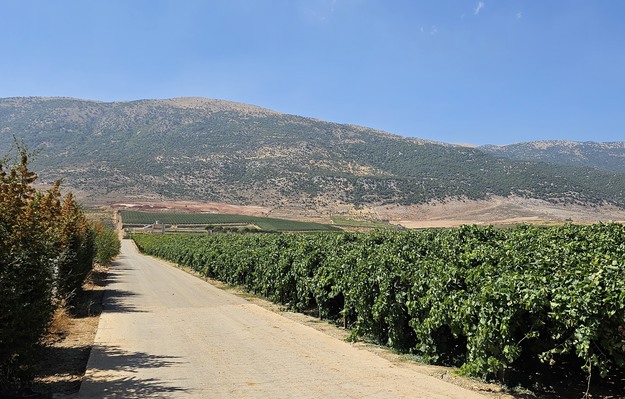
Avocados and cherries
Regarding future plans, the grape growers do not exclude expanding its fruit assortment. "Avocado is an option. But that will be somewhere else in Lebanon. That's impossible at the Bekaa Valley's 1,000 m altitude. You can grow avocados up to, at most, 600-700 meters above sea level. Cherries are another possibility. Cherries from Arsal, a region in the north of the country close to the Syrian border, are quite well-known for their unique flavor and virtually organic cultivation. Pests don't plague those growers, and they don't have to use fertilizers. I saw plenty of interest in these late cherries at Fruit Logistica. By including avocados and cherries in our cultivation program, we could offer more employment for several months a year. Remember, we grow potatoes and wheat, too."
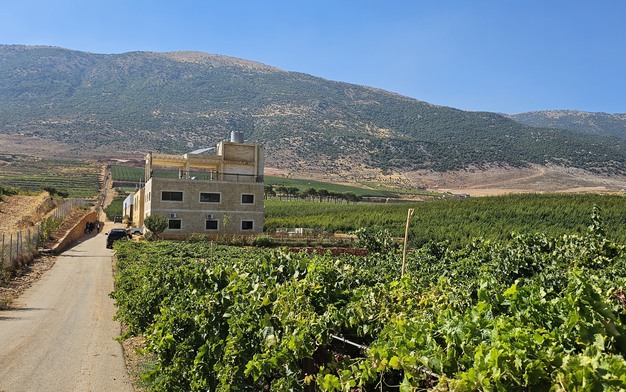
10 years ago the whole country looked like it does in the background
Mehydin's father is even up for venturing into the organic sector. "With our blessed climate, organic cultivation is certainly possible. Interested buyers can contact us, and we can build something together. We already have the ideal growing conditions, know-how, enthusiasm, and space," he concludes.
Agrotica will be at the upcoming Fruit Attraction in Madrid in Hal 1, stand 1C10.
For more information: 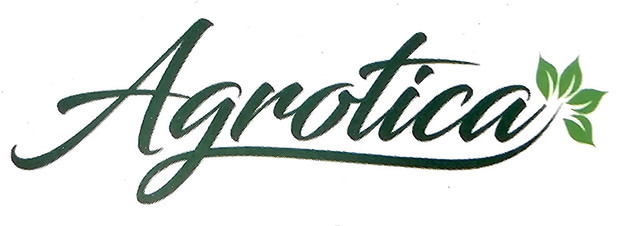
Mehydin Kazoun (manager)
Agrotica
Tel: +961 33206989 (Libanon)
[email protected]










